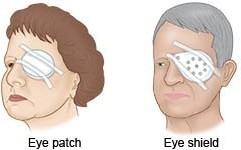This is an 11-month-old male with a 2-day history of fussiness, increased nasal secretions, and cough. The baby is 24.3 lb. (11 kg). He was born at 34 weeks gestation and spent several weeks in the neonatal intensive care unit for poor feeding.
He is currently up to date on vaccinations and is meeting appropriate developmental milestones. The parents deny that he takes any medications at home.
Review H and P and flow sheet.
Select which assessment findings indicate that the baby has an increased fluid requirement. Select all that apply.
Temperature 103 °F (39.4 °C)
Blood pressure 89/51 mmHg
Respiratory rate 55 breaths/min
Copious, clear secretions from both nostrils
Oxygen saturation 95%
Wet diaper with 12 mL of urine
Heart rate 159 bpm
Correct Answer : A,C,D,E
Fever increases fluid loss through perspiration.
Increased respiratory rate can lead to increased fluid loss through evaporation. Increased nasal secretions can result in fluid loss.
High oxygen flow can cause drying of the mucous membranes and increase fluid requirements.
The following findings do not necessarily indicate increased fluid requirements: Blood pressure alone does not indicate increased fluid requirements.
Oxygen saturation within the normal range does not indicate increased fluid requirements.
Although urine output is important to assess hydration status, 12 mL of urine may not necessarily indicate increased fluid requirements.
Heart rate alone does not indicate increased fluid requirements.
Nursing Test Bank
Naxlex Comprehensive Predictor Exams
Related Questions
Correct Answer is B
Explanation
After retinal detachment surgery, it is crucial to protect the eye and the surgical repair site from accidental trauma or pressure. Providing an eye shield helps to shield the eye during sleep when the client may not have conscious control over their movements.
This can help prevent inadvertent rubbing or bumping of the eye, which could potentially disrupt the surgical repair and hinder the healing process.
Obtaining vital signs every 2 hours during hospitalization is a routine nursing intervention for postoperative care in general but is not specific to retinal detachment surgery. The frequency of vital sign monitoring may vary depending on the client's overall condition and the healthcare provider's orders.
Teaching a family member to administer eye drops may be necessary for the client's ongoing care, but it is not specifically related to the immediate postoperative period. Eye drop administration instructions can be provided as part of the client's discharge teaching.
Encouraging deep breathing and coughing exercises is a general postoperative intervention that promotes respiratory function and helps prevent complications such as pneumonia. While important for overall postoperative care, it is not specific to retinal detachment surgery.

Correct Answer is B
Explanation
Administering a large volume of medication in a single injection is not recommended for infants as it can lead to discomfort, tissue trauma, and potential complications such as muscle fibrosis or nerve injury. Dividing the medication into two injections with volumes under 1 mL is a common practice for infants and can help minimize discomfort and complications.
In addition, the nurse should select an appropriate needle size and injection site based on the infant's size and age. A 22 gauge 1 1/2 inch (3.8 cm) needle is too large for an infant and may cause discomfort and tissue damage. The nurse should use a smaller gauge needle and choose an appropriate injection site, such as the vastus lateralis muscle in the thigh or the dorsogluteal muscle in the buttocks, based on the infant's age and size.
Finally, administering an injection into the deltoid muscle is not recommended for infants as this muscle is not fully developed until later in childhood. Using a quick dart-like motion to inject into the dorsogluteal site is also not recommended as it can cause tissue damage and discomfort. Instead, the nurse should use a slow, steady technique to administer the injection while ensuring the infant is held securely by the parent or another caregiver.
Whether you are a student looking to ace your exams or a practicing nurse seeking to enhance your expertise , our nursing education contents will empower you with the confidence and competence to make a difference in the lives of patients and become a respected leader in the healthcare field.
Visit Naxlex, invest in your future and unlock endless possibilities with our unparalleled nursing education contents today
Report Wrong Answer on the Current Question
Do you disagree with the answer? If yes, what is your expected answer? Explain.
Kindly be descriptive with the issue you are facing.
